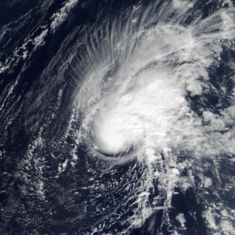Tropical Storm Zeta (2005)
2007 Schools Wikipedia Selection. Related subjects: Storms
| Tropical storm ( SSHS) | ||
|---|---|---|
|
Tropical Storm Zeta in the open Atlantic Ocean on January 4. |
||
| Formed | December 29, 2005 | |
| Dissipated | January 6, 2006 | |
| Highest winds |
|
|
| Lowest pressure | 994 mbar ( hPa) | |
| Damage | None reported | |
| Fatalities | None reported | |
| Areas affected |
No land areas | |
| Part of the 2005 Atlantic hurricane season |
||
Tropical Storm Zeta was a late-developing tropical storm over the central Atlantic which formed after the 2005 Atlantic hurricane season had officially ended, and continued into January. It extended the record number of storms in a season to twenty-eight.
Zeta developed late on December 29 and headed to the west. Throughout the storm's lifetime, the National Hurricane Centre continually predicted it would weaken rapidly. Like the previous tropical cyclone Hurricane Epsilon, Zeta defied these predictions. The storm reached its peak strength on January 2, 2006 before finally dissipating on January 6. As Zeta never approached land there was no impact from the storm.
Storm history
Late on December 29, 2005, a tropical depression developed in the east-central Atlantic from a frontal trough and became a tropical storm early the next day. As this was more than four weeks after the official end of the season, the National Hurricane Centre didn't operationally notice the system until after it had already become a tropical storm. Initially the storm headed to the northwest but stalled late on December 31 before heading westwards, gradually strengthening to winds of 60 mph (95 km/h) as it did so. As with the previous storm, Hurricane Epsilon, the National Hurricane Centre continuously forecast that Zeta would weaken in response to high level shear but Zeta held onto its strength, like Epsilon had done.
Tropical Storm Zeta weakened slightly on January 2, before intensifying further to its peak strength with 65 mph (100 km/h) winds. One of the models suggested that Zeta could strengthen further and become a hurricane but this did not occur. Tropical Storm Zeta continued to defy forecasts of weakening and on January 4 increasing frustration led NHC forecaster, Dr. Lixion Avila to say that he had "run out of things to say".
The effects of wind shear finally took their toll late on January 4, and Zeta's convection began to die down. This led to Tropical Storm Zeta weakening to a minimal tropical storm. The NHC continued to overestimate how quickly Zeta would dissipate and early on January 5 they operationally downgraded Zeta to a depression, which was later confirmed to have been an error. Zeta continued to move west-northwestward, barely holding on to tropical storm status before becoming disorganized again. Zeta weakened into a tropical depression on January 6 and dissipated into a remnant later that day, finally ending the 2005 season. The remnant low retained its identity for a further day before it dissipated 660 miles (1060 km) southeast of Bermuda.
Impact
Several of the crews that were taking part in the 2005 Atlantic Rowing Race were affected with heavy seas and strong adverse winds from Tropical Storm Zeta. The ship Liberty Star made several reports of strong winds from Tropical Storm Zeta, including one of 40 mph (65 km/h) winds early on December 31, when the ship was about 45 miles (75 km) north of the centre of the storm.
Tropical Storm Zeta never threatened land so no coastal watches or warnings were issued. There was no reported damage or fatalities from Zeta.
Records
When Tropical Storm Zeta formed at 0600 UTC on December 31, it became the second latest-forming tropical cyclone ever recorded in the Atlantic, forming about six hours earlier than Hurricane Alice did in 1954. Zeta is only the second Atlantic tropical cyclone on record to have existed in two calendar years (after Alice). Tropical Storm Zeta also extended the record number of storms to form in the 2005 season to twenty-eight, seven more than the previous record held by the 1933 season.

